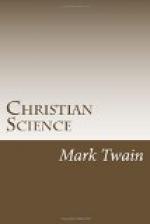“The Bible and the above—named book [Science and Health], with other works by the same author,” must be his only text-books for the commerce —he cannot forage outside.
Mrs. Eddy’s words are to be the sole elucidators of the Bible and Science and Health—forever. Throughout the ages, whenever there is doubt as to the meaning of a passage in either of these books the inquirer will not dream of trying to explain it to himself; he would shudder at the thought of such temerity, such profanity, he would be haled to the Inquisition and thence to the public square and the stake if he should be caught studying into text-meanings on his own hook; he will be prudent and seek the meanings at the only permitted source, Mrs. Eddy’s commentaries.
Value of this Strait-jacket. One must not underrate the magnificence of this long-headed idea, one must not underestimate its giant possibilities in the matter of trooping the Church solidly together and keeping it so. It squelches independent inquiry, and makes such a thing impossible, profane, criminal, it authoritatively settles every dispute that can arise. It starts with finality—a point which the Roman Church has travelled towards fifteen or sixteen centuries, stage by stage, and has not yet reached. The matter of the Immaculate Conception of the Virgin Mary was not authoritatively settled until the days of Pius IX. —yesterday, so to speak.
As already noticed, the Protestants are broken up into a long array of sects, a result of disputes about the meanings of texts, disputes made unavoidable by the absence of an infallible authority to submit doubtful passages to. A week or two ago (I am writing in the middle of January, 1903), the clergy and others hereabouts had a warm dispute in the papers over this question: Did Jesus anywhere claim to be God? It seemed an easy question, but it turned out to be a hard one. It was ably and elaborately discussed, by learned men of several denominations, but in the end it remained unsettled.
A week ago, another discussion broke out. It was over this text:
“Sell all that thou hast and distribute unto the poor.”
One verdict was worded as follows:
“When Christ answered the rich young man and said for him to give to the poor all he possessed or he could not gain everlasting life, He did not mean it in the literal sense. My interpretation of His words is that we should part with what comes between us and Christ.
“There is no doubt that Jesus believed that the rich young man thought more of his wealth than he did of his soul, and, such being the case, it was his duty to give up the wealth.
“Every one of us knows that there is something we should give up for Christ. Those who are true believers and followers know what they have given up, and those who are not yet followers know down in their hearts what they must give up.”
Ten clergymen of various denominations were interviewed, and nine of them agreed with that verdict. That did not settle the matter, because the tenth said the language of Jesus was so strait and definite that it explained itself: “Sell all,” not a percentage.




